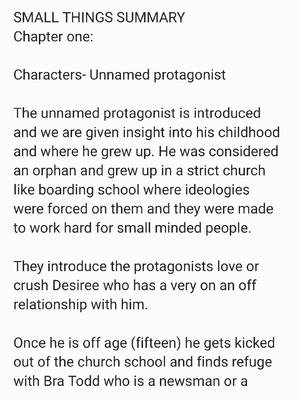- Information
- AI Chat
Was this document helpful?
Enn-ass-1 - In this section you are given two essay topics and you are supposed to select
Course: Foundations in English Literary Studies (ENG1501)
999+ Documents
Students shared 1368 documents in this course
University: University of South Africa
Was this document helpful?

"The 12 Rules of Survival"
by Laurence Gonzales
From "Deep Survival: Who Lives, Who Dies, and Why"
"As a journalist, I've been writing about accidents for more than thirty years. In the last 15 or so years,
I've concentrated on accidents in outdoor recreation, in an effort to understand who lives, who dies, and
why. To my surprise, I found an eerie uniformity in the way people survive seemingly impossible
circumstances. Decades and sometimes centuries apart, separated by culture, geography, race,
language, and tradition, the most successful survivors–those who practice what I call <deep survival=– go
through the same patterns of thought and behavior, the same transformation and spiritual discovery, in
the course of keeping themselves alive. Not only that but it doesn't seem to matter whether they are
surviving being lost in the wilderness or battling cancer, whether they're struggling through divorce or
facing a business catastrophe– the strategies remain the same. Survival should be thought of as a
journey, a vision quest of the sort that Native Americans have had as a rite of passage for thousands of
years. Once you're past the precipitating event– you're cast away at sea or told you have cancer– you
have been enrolled in one of the oldest schools in history. Here are a few things I've learned that can
help you pass the final exam.
1. Perceive and Believe: Don't fall into the deadly trap of denial or of immobilizing fear. Admit it: You're
really in trouble and you're going to have to get yourself out. Many people who in the World Trade
Center on September 11, 2001, died simply because they told themselves that everything was going to
be all right. Others panicked. Panic doesn't necessarily mean screaming and running around. Often it
means simply doing nothing. Survivors don't candy-coat the truth, but they also don't give in to
hopelessness in the face of it. Survivors see opportunity, even good, in their situation, however grim.
After the ordeal is over, people may be surprised to hear them say it was the best thing that ever
happened to them. Viktor Frankl, who spent three years in Auschwitz and other Nazi concentration
camps, describes comforting a woman who was dying. She told him, <I am grateful that fate has hit me
so hard. In m former life I was spoiled and did not take spiritual accomplishments seriously.= The phases
of the survival journey roughly parallel the five stages of death once described by Elizabeth Kubler Ross
in her book On Death and Dying: Denial, anger, bargaining, depression, and acceptance. In dire
circumstances, a survivor moves through those stages rapidly to acceptance of his situation, then
resolves to do something to save himself. Survival depends on telling yourself, <Okay, I'm here. This is
really happening. Now I'm going to do the next right thing to get myself out.= Whether you succeed or
not ultimately becomes irrelevant. It is in acting well– even suffering well– that you give meaning to
whatever life you have to live.
2. Stay Calm – Use Your Anger: In the initial crisis, survivors are not ruled by fear; instead, they make use
of it. Their fear often feels like (and turns into) anger, which motivates them and makes them feel
sharper. Aron Ralston, the hiker who had to cut off his hand to free himself from a stone that had
trapped him in a slot canyon in Utah, initially panicked and began slamming himself over and over
against the boulder that had caught his hand. But very quickly, he stopped himself, did some deep
breathing, and began thinking about his options. He eventually spent five days progressing through the
stages necessary to convince him of what decisive action he had to take to save his own life. When
Lance Armstrong, six-time winner of the Tour de France, awoke from brain surgery for his cancer, he
first felt gratitude. <But then I felt a second wave, of anger... I was alive, and I was mad.= When friends










